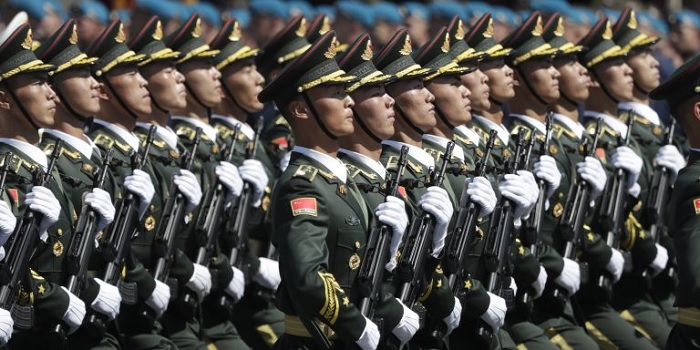
China’s military-civil fusion (MCF) project aims to harness the capability of the country’s civilian sectors, including science, and technology, to advance China’s military, economic, and technological prowess.
MCF serves as a lynchpin of China’s goal to develop a ‘world class military’ by 2049.
Under Xi, the MCF project has been elevated to a national military strategy, raising concerns about Beijing’s illegal transfer of exquisite dual-use technology from the private sector and academia to the People’s Liberation Army
The Chinese Communist Party’s lack of transparency regarding MCF, coupled with Xi’s aggressive foreign policy, places China on a collision course with other countries and could destabilize the broader region.
China’s military-civil fusion (MCF) strategy aims to aid China in its quest to become a global power. In the process, it has raised concerns about how other countries should respond to cyberespionage, intellectual property theft, and the illegal transfer of certain dual-use technologies—these issues span the private sector to academia. Though the concept of a military-civil integration has been a component of modern Chinese governing principles since Mao Zedong, the current principle of military-civil fusion was officially incorporated as a military strategy under President Xi Jinping. Xi personally oversees the implementation and execution of the MCF under the Central Military Commission—signaling the centrality of the strategy to China’s military goals, including a completed military modernization by 2035, and training and equipping a ‘world class military’ by 2049.
The principal ideas behind the MCF include harnessing China’s economic success in order to advance its military capability—for example through ‘Made in China 2025’—while also enabling mobilization of the economy for future military conflicts. The Chinese Defense sector, contrary to that of the United States, has historically been relegated to the domain of the Chinese military and a dozen state-owned enterprises. The MCF strategy seeks to effectively break down barriers between the private sector, academia, research and technology and the People’s Liberation Army (PLA), enabling the latter to employ any dual-use industries and technologies for military advancements and capabilities development. Areas that have been identified for specific interest include artificial intelligence (AI), aerospace technology, micro and nano satellites, automated systems and robotics, semiconductors, advanced nuclear technology, quantum computing, and more. Analysts have noted that Xi’s apparent emphasis on MCF could suggest that China is desperately playing catch-up with the United States and other countries that have a robust private R&D sector. The MCF has been plagued by many of the same ills that other top-down strategies implemented by the Chinese Communist Party (CCP) have experienced—corruption, waste, and uncoordinated leadership.
Evidence suggests that China’s MCF strategy is also being implemented abroad, which not only threatens other countries’ national security, but also their commercial and economic interests. This competition could intensify as countries look to recover from the devastating economic impact of COVID-19. The United States, the United Kingdom, European states, and Australia fear that China’s MCF strategy further enables and incentivizes illegal transfers of dual-use technology and other critical industries from the commercial and academic sectors to the PLA. Such illegal transfers can occur through exports, foreign direct investment and acquisitions, cyberespionage, traditional industrial espionage, research collaboration and talent acquisition, and influence operations. Under Xi’s intensified implementation of the MCF, the already blurred line between China’s private and public sector has been further obfuscated, an arrangement posing obvious security threats. The examples are numerous. German-produced engines exported to China for commercial use are now found in PLA Navy submarines and frigates. According to FBI director Christopher Wray, ‘Over the past decade, [the FBI has] seen economic espionage cases with a link to China increase by approximately 1,300 percent.’ The Australian Strategic Policy Institute estimates that since 2007, over 2,500 military scientists and engineers have been sponsored by the PLA to study abroad, especially in Five Eyes countries (US, UK, Canada, Australia, and New Zealand). China’s application of the MCF abroad threatens the democratization of science and the philosophy of academic openness and collaboration. Transnational research collaboration is key to combatting the most pressing security challenges of our time, including global health crises and climate change.
The elevation of the MCF to a national strategy and the general lack of transparency surrounding this strategy, coupled with president Xi’s increasingly assertive foreign policy, raises questions about China’s intent. One of Xi’s signature foreign policies, the Belt and Road Initiative (BRI), has been heavily criticized for entrapping cash-strapped countries in debts that cannot be repaid. When countries default on their Chinese loans, commercial ventures along BRI have been re-purposed by China for military use—such as the PLA base in Djibouti. The PLA has capitalized on the COVID-19 pandemic and instituted its own version of ‘mask diplomacy,’ targeting countries along the BRI for military aid, likely to garner good-will and buy-in from elites and military officials in those countries. In the economic fallout from the COVID-19 pandemic, Beijing has displayed little willingness to forgive debt compared to Western-led lending institutions, like the International Monetary Fund. Such actions challenge the CCP’s statements that the BRI is an exclusively economic and commerce-oriented policy and raises concerns that the BRI plays a role in complementing the MCF project. The COVID-19 pandemic may prove to further infringe upon states’ sovereignty and aid Xi’s implementation of the MCF strategy abroad.
 Eurasia Press & News
Eurasia Press & News



